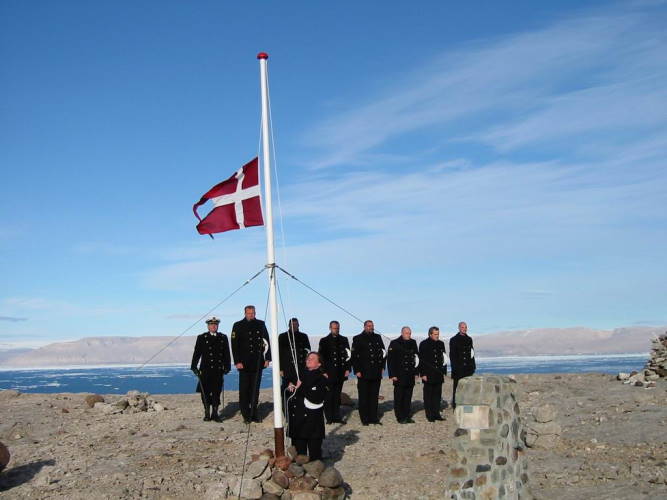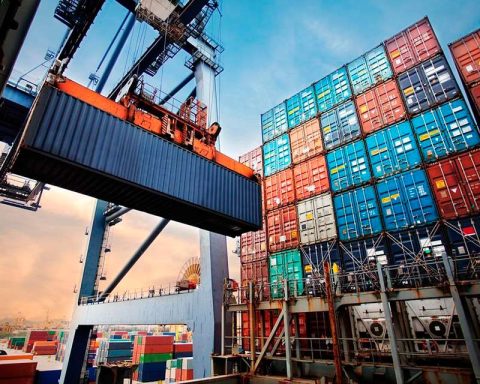MONTANA, United States. — Hans Island is a small, uninhabited and barren island located in the Nares Strait, between Greenland and Ellesmere Island, within the territorial waters of Canada and Denmark, countries that claim it as their own territory. On their periodic visits to the island, the military from Canada and Denmark remove the other country’s flag and place their own.
The territorial dispute takes on a very civil character, because when the Danish navy removes the Canadian flag to plant its own, it also leaves behind a bottle of Schnapps, a traditional Danish alcoholic beverage. Not to be outdone, the Canadian Navy, when it removes the Danish flag, plants the Canadian flag and leaves behind a bottle of Canadian Club. Health!
Unfortunately, territorial disputes do not always adopt such a civilized behavior. Territorial disputes are often related to the ownership of natural resources, but also to the dynamics of culture, religion, ethnicity and nationalism. There are currently more than 150 disputes over land issues in the world. Some of the most controversial are those in Crimea, the East China Sea, Jammu-Kashmir, the Golan Heights, the Gaza Strip, the West Bank and Western Sahara.
In Latin America, according to Professor Jorge I. Dominguez: “Since the year 2000, five Latin American border disputes between neighboring states have led to the use of force, and another two to its deployment. These incidents involved ten of the nineteen independent countries of South and Central America. In 1995 Ecuador and Peru went to war with the result of more than a thousand dead and wounded, and considerable economic losses. However, by international standards, the Americas were comparatively free of interstate warfare during the 20th century. Latin Americans, for the most part, do not fear aggression from their neighbors. They don’t expect their countries to go to war with each other.”
However, Latin American countries are preparing to involve their military in territorial disputes. Since 1990, Nicaragua has had military disputes with four countries, Venezuela and Honduras have had military disputes with three neighboring states each, and El Salvador, Guatemala, Guyana, and Colombia have had militarized disputes with two neighbors each. However, only the 1995 dispute between Ecuador and Peru went to war.
Professor Domínguez presents several arguments to explain the relative rarity and short duration of interstate wars in Latin America. Among them, the common identity of Latin American countries stands out as a main factor in fostering interstate peace on the continent.
However, that shared identity is limited. According to a report from PewResearch As of 2011, the majority (51%) of Latin Americans identify themselves by their family’s country of origin (Mexican, Cuban, etc.) and not by a pan-ethnic label. Only 24% identify as Hispanic or Latino. Furthermore, most Hispanics in the United States do not realize that there is a common culture. Almost 69% say that US Hispanics have different cultures, while only 29% say they share a common culture.
Political scientists have advanced the notion that we consider ourselves Chilean or Argentine simply because we think we are. In other words, according to this vision, a nationality is nothing more than a social construction. A nationality is an “imagined community”.
Interestingly, the level of personal trust is lower among Latin Americans than among Americans. Overall, 61% of Americans say that “you have to be very careful when dealing with people.” Among Latin Americans, this metric of mistrust increases to 86%. It also appears that the political views of Hispanics are more liberal than those of Americans. 30% of Hispanics describe their political views as liberal or very liberal, compared to 21% of the US public. From personal experience, I suspect that Cubans are an exception to this liberal attitude.
Latin Americans may not exchange rum and pisco on a desert island, but they share an identity and think of their neighbors as adversaries, not enemies.
OPINION ARTICLE
The opinions expressed in this article are the sole responsibility of the issuer and do not necessarily represent the opinion of CubaNet.
Receive information from CubaNet on your cell phone through WhatsApp. Send us a message with the word “CUBA” on the phone +1 (786) 316-2072, You can also subscribe to our electronic newsletter by giving click here.

















